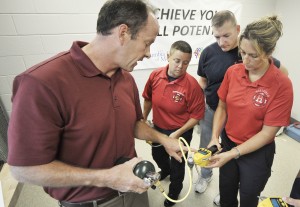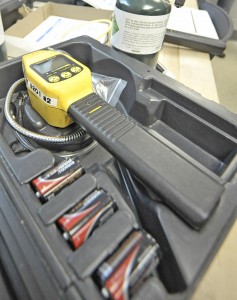
Westfield Fire Department Capt. Rebecca Boutin, right, the training and safety coordinator for the Western Massachusetts Technical Rescue Team, receives a hands-on training demonstration of a new Sensit Gold 2 Combustible Gas Indicator (CGI) from Paul Lamb, left, a certified trainer from the Sensit Company. The state-of-the-art detection system is designed to warn rescuers of toxic and explosive gases. Columbia Gas donated three meters each valued at $1,500. (Photo by Frederick Gore)
EASTHAMPTON – Christmas came early for Western Mass. Technical Rescue (WMTR) Friday, as the unit, which is comprised of over 80 firefighters spread throughout Massachusetts’ four western counties, received a donation of three Sensit Gold Combustible Gas Indicators (CGI) from Columbia Gas of Massachusetts.
At Columbia’s Easthampton facility Friday morning, several WMTR leaders were on hand to receive the devices and go through a two-hour training seminar. The devices are used to evaluate the atmosphere of a confined space and to monitor the presence of explosive or toxic gases.

Three handheld Sensit Gold 2 Combustible Gas Indicators (CGI) were donated to the Western Massachusetts Technical Rescue Team from Columbia Gas of Massachusetts on Friday morning. The meters detect the presence of explosive or toxic gases and are valued at $1,500 each. (Photo by Frederick Gore)
“We’ll become trainers today, and then we’ll bring it back to our teams,” said Rebecca Boutin, a captain with the Westfield Fire Department who has been with WMTR for 15 years. “These meters are more modern and equipped with more technology. We aren’t able to enter a confined space without these meters.”
“We do lots of stuff that people can’t do, because we have the equipment and training,” said Bill Selkirk, director of Boutin’s WMTR team and assistant fire chief in South Hadley. “We’ve been on at least five incidents now. What we do is definitely technical – high angle rescue, confined space, collapsed buildings.”
Selkirk said that any confined space rescue requires one of these CGI devices.
“The meters are not new to us in the fire services. The officers, we use them all the time,” he said, adding that the team was relegated to borrowing meters from area fire departments prior to this donation.
Boutin said that the WMTR is divided into three teams which oversee Hampden County, Berkshire County, and a team composed of both Franklin and Hampshire Counties.
“We’ve strategically placed the meters so that, when the Hampden County team gets called out, which is the most likely to deal with confined space and trench rescue, we not only need one gas meter but also a backup meter,” she said. “So the rescuer that’s going into the confined space has a meter on them and we have a backup rescuer in case one of us goes down.”
“Over 50 percent of the people who are killed in confined spaces are the would-be rescuers,” said Boutin. “So it’s important for us to have this type of training with Columbia Gas because these are the people we’re going to potentially be going in for.
“So it’s a good relationship to have,” she said.

